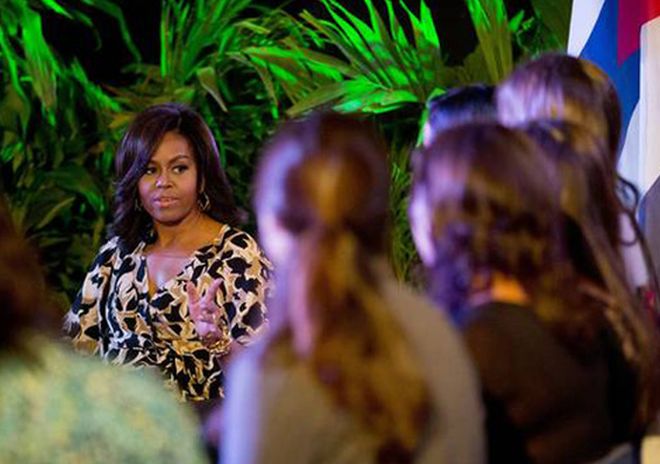The First Lady of the United States, Michelle Obama, spoke with ten female Cuban students in Havana this Monday, March 21, regarding their experiences as part of the official visit to the island
Two students from the Saúl Delgado pre-university high school, one from the Antonio Guiteras polytechnic institute, and others from the San Alejandro Academy of Arts, the Higher Institute of Arts and the University of Havana, answered questions from the First Lady.
The meeting took place at the Fábrica de Arte Cubano, and coincided with the first anniversary of the “Let Girls Learn” initiative launched by Michelle, which seeks to ensure access to education for 62 million girls and adolescents across the world, prevented from attending schools due to financial, physical and cultural barriers.
In Cuba, universal access to education is guaranteed for all girls and adolescents, regardless of where they live, the color of their skin or whether they have a disability or are hospitalized.
The Cuban students explained the basic education system through the ninth grade and noted that from tenth grade they can specialize in certain subjects, while Michelle expressed interest in arts education, which starts from an early age on the island.
In Cuba, thanks to the free public education system, women constitute 48% of the workforce and receive equal pay for equal work. Nine of the local governments in the fifteen Cuban provinces are led by women, the administration of justice is also mostly in female hands, eight out of ten professionals in the education sector are women, 48.86% of parliamentarians and 45.2% of the members of the State Council are women.
Public health policies have ensured that Cuban women have a life expectancy of over 80, and the island has one of the lowest maternal mortality rates in the world.
Among the rights enjoyed by all Cuban women are access to pensions for widows, paid maternity leave until one year after the baby is born, and the right to land and to receive bank loans.
The current rate of female unemployment on the island is less than 3.5 percent, and the country carries out specific programs to develop a full culture of equality and social inclusion.
 Escambray ENGLISH EDITION
Escambray ENGLISH EDITION






Escambray reserves the right to publish comments.